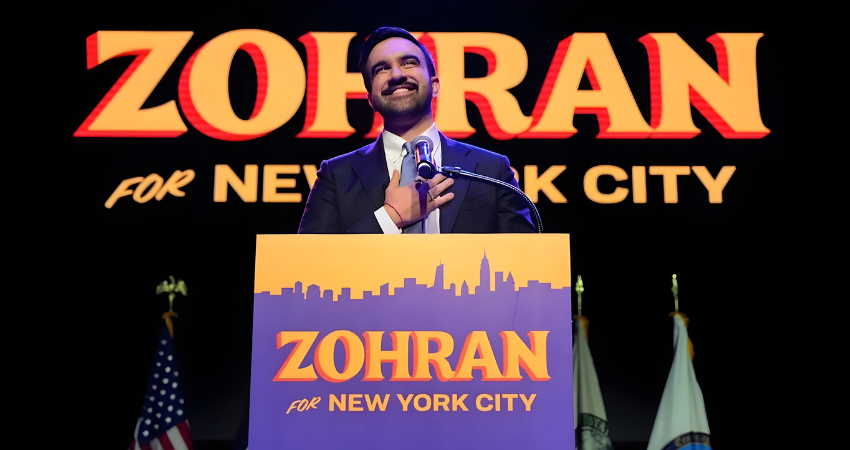If you’ve scrolled through social media in the past few days, you’re no stranger to the name Zohran Mamdani. And rightly so as he made global headlines by being chosen to be the newly elected Mayor of New York City, the financial capital of the United States.
With this historic win, Mamdani has become a global symbol of possibility. He didn’t just defeat former Governor Andrew Cuomo by 180,000 votes but he also made history as the first Indian-American, first Ugandan-American, first Muslim, first millennial, second democratic socialist, and youngest mayor since 1892 to hold office in New York City. He’s also only the seventh immigrant to be elected mayor since 1834.
Throughout his campaign, Mamdani championed an ambitious progressive agenda focused squarely on New York City’s crippling cost-of-living crisis, an issue that resonated deeply with working-class residents.
His key promises included implementing a rent freeze, expanding affordable housing, introducing free bus fares, creating city-owned grocery stores selling food at wholesale prices, providing universal childcare, and establishing a $30 minimum wage.
To fund this sweeping plan, Mamdani proposed a modest tax increase of an additional 2% on New Yorkers earning over $1 million annually arguing that those who benefited the most from the city’s growth should contribute more to its wellbeing.
A Battle Against the Political Elite
Mamdani’s democratic socialist platform drew intense opposition from powerful political and financial circles. Former President Donald Trump labeled him a “communist lunatic” and a “disaster waiting to happen,” publicly endorsing Cuomo instead.
Cuomo himself tried to discredit Mamdani by calling him a “terrorist sympathiser”,a thinly veiled attack rooted in prejudice. Wealthy donors poured millions into supporting Cuomo’s campaign, while key figures within the Democratic establishment offered little backing, wary of Mamdani’s anti-corporate stance.
When asked how he planned to raise taxes without support from party elites, Mamdani responded calmly:
“It’s time for leadership that doesn’t twist arms but builds partnerships. My vision is driven by what’s actually happening on the ground.”
How Did He Win?
Despite facing one of the most well-funded and coordinated opposition campaigns in recent memory, Mamdani’s victory was powered by a laser focus on economic justice and an unprecedented grassroots movement
Mandate on Affordibility
The single most crucial factor in his win was his unwavering attention to the cost-of-living crisis. His promises of rent freezes, free transport, and universal childcare directly addressed the struggles of everyday New Yorkers particularly working-class families, young voters, and people of colour. His campaign framed the race as a fight between the working people of New York and the billionaire class funding his opponent, striking a powerful chord.
Grassroots Power and Record Turnout
Mamdani’s campaign mobilised an estimated 100,000 volunteers who knocked on over three million doors across the city making it a historic show of people power. This outreach energised young and first-time voters, leading to New York’s highest turnout in a non-presidential mayoral election since 1969.
Mastery of New Media
Through savvy use of TikTok, Instagram, and other platforms, Mamdani connected directly with voters. His short, engaging videos described as “snappy,” “joyful,” and “always on message” helped him bypass traditional media and build a loyal online following.
A Clear Contrast
The race ultimately became a stark choice between a young, idealistic progressive and an old-guard politician tainted by scandal and elite funding. Mamdani’s consistency and sincerity stood out in an age of political cynicism and voters rewarded him for it.
The Power of Youth and Multicultural Representation
Mamdani’s ability to stay true to his principles, even under intense personal and political attacks, marked him as a sincere and consistent leader, one that voters rewarded with record turnout.
His story is a powerful reminder that the future belongs to those who act. For communities that value multiculturalism and continue to face systemic barriers, his victory offers a vital lesson: there is immense power in youthful participation, steadfast conviction, and unity across diversity.
By focusing on the shared economic struggles that shape everyday life, Mamdani showed how empathy and persistence can drive real change. His win is a clarion call: a reminder that a unified, consistent voice is stronger than corporate money or political cynicism.
If a Ugandan-born, Indian American, Muslim millennial democratic socialist can take the top job in the most powerful city in America against all odds, it shows that the time for new, representative leadership is not a distant dream, it is now.
Go and check out Zohran Mamdani’s victory speech which captures the energy and multicultural spirit of the moment, complete with a nod to his Indian roots through the Bollywood anthem “Dhoom Machale” (loosely translated as ‘Make a Storm’) a fitting celebration of immigrant pride, radical politics, and youthful exuberance that marked a truly historic win.





